-
The University
- Welcome
- Who we are
- Media & PR
- Studying
-
Research
- Profile
- Infrastructure
- Cooperations
- Services
-
Career
- Med Uni Graz as an Employer
- Educational Opportunities
- Work Environment
- Job openings
-
Diagnostics
- Patients
- Referring physicians
-
Health Topics
- Health Infrastructure
Research projects
Today the majority of up-to-date and internationally competitive research takes place in networks so that large research projects can be conducted. These interdisciplinary networks operate at both the national and international levels.

Medical progress in a variety of research areas
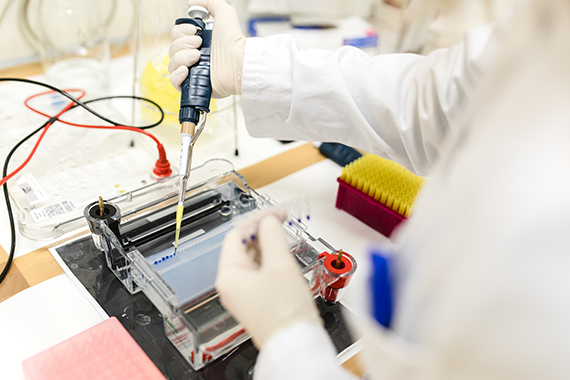
Lipid and energy metabolism
Obesity, type 2 diabetes, nonalcoholic fatty liver disease and cancer are common diseases that represent a great challenge to the health care system. The special research area "Lipid Hydrolysis" funded by the Austrian Science Fund (FWF) is pursuing the long-term goal of discovering the role lipid hydrolases play in the development of disease in order to develop new treatment strategies.
It is a great challenge to identify all lipid hydrolases and describe their functions. A comprehensive understanding of the structure, function and physiological significance of this enzyme is essential in order to detect new connections between lipid and energy metabolism and the development of metabolic diseases.

A center for placenta research
Many pregnancy complications can be attributed to a disturbance in placenta function. The doctoral program and research project "Inflammatory Disorders in Pregnancy," or DP-iDP for short, investigates the interaction between pregnancy, inflammation and the placenta in diseases affecting the mother and the fetus.
New translational methods are applied and basic researchers and clinicians work in close cooperation. Primarily diseases such as diabetes, obesity, preclampsia or intrauterine growth restriction arise along with multifactorial inflammatory diseases of the placenta. Since the exact backgrounds and mechanisms are largely unknown, they make up the research focus of this program.
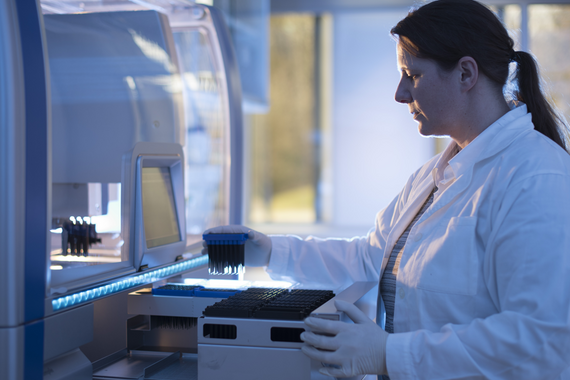
Non-invasive early cancer detection
Liquid biopsy is used in a variety of ways in cancer treatment and is applied to continually monitor the progress of therapy. Employing a blood test instead of tissue biopsies, it is also seen as a very promising approach for early detection of cancer.
Before liquid biopsy can be broadly used outside of clinical trials and research projects, the sensitivity and accuracy as well as the predictive and prognostic value of ctDNA must be evaluated in large prospective studies.
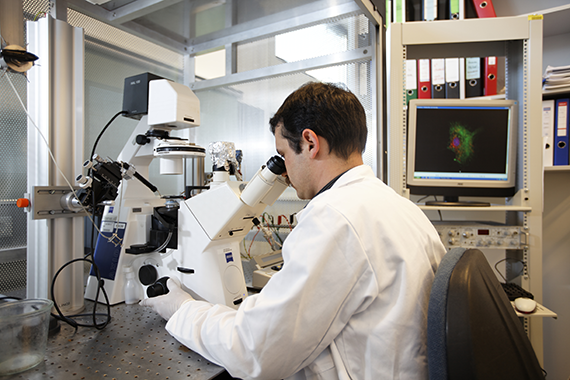
Individual risk assessment of cardiovascular diseases
Cardiovascular diseases remain one of the leading causes of death worldwide. Often, a blood test would suffice to perform an individual risk assessment, but this is often associated with costly laboratory tests that cannot be performed immediately in a doctor's office.
The EU project PoCCardio has set itself the goal of further developing a device that already exists in its basic technological form and can be easily used in doctors' offices. In the future, it should be possible to perform previously time-consuming laboratory tests directly at the point of care, e.g., in a general medical practice or similar setting.

Biomarker research
Biomarkers are units that can be measured biologically such as enzymes, hormones and genes that make early detection and individual therapy of diseases possible. Completely new types of biomarkers also allow entirely new treatments—and that is what the CBmed competence center is researching. These findings are implemented into practical applications in cooperation with national and international companies.
The vision of CBmed is to become the world's most recognized center for biomarker research in personalized medicine by 2030. It will achieve this by integrating cutting-edge technologies with international and interdisciplinary expertise in the fields of cancer and cardiometabolic health.

Metabolic regulation of healthy aging
The large-scale research project “MetAGE: Metabolic Regulation of Healthy Aging – From Models to Humans” focuses on the regulation of healthy aging. The aim is to better understand age-related loss of metabolic control in both humans and model organisms. The scientists are investigating how disturbances in metabolic control influence the risk of age-related diseases. At the same time, targeted nutritional interventions are being clinically tested. What makes MetAGE unique is that the findings from basic research are directly transferred to clinical research. This strengthens the concept of prevention, so that in the future, “medicine for disease” will become “medicine for health.”
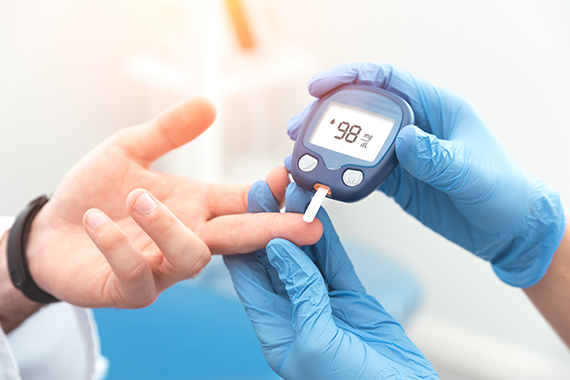
International diabetes network
According to current estimates, around ten percent of the world's population is affected by diabetes. In type 1 diabetes mellitus, the pancreas cannot supply the body with any or enough of the insulin it requires. 17 million people around the world suffer from this type of diabetes. The international research network INNODIA has set the goal of developing and expanding the search for therapeutic options that prevent and cure type 1 diabetes.
Med Uni Graz significantly contributes to the success of the project by providing its expertise: Current developments such as the artificial pancreas or the GlucoTab app for diabetes management are proof of the innovative power of Graz metabolism experts.
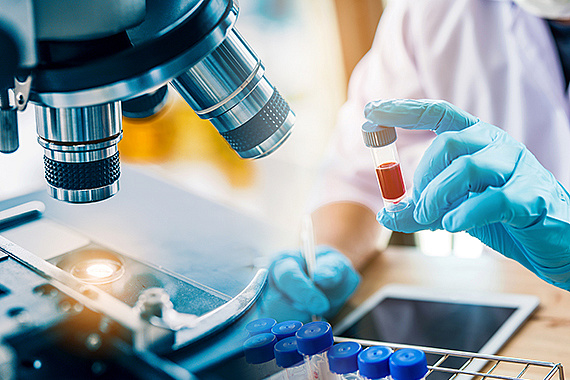
Quick detection of diseases
Symptoms such as high fever and a strong feeling of malaise can be signs of a large number of dangerous inflammatory and infectious diseases. A range of blood tests, biopsies, MRT and CT scans and other tests are often required to diagnose a disease. The development of a quick blood test to diagnose severe inflammatory and infectious diseases is the goal of scientists in the research project "DIAMONDS."
The new test may shorten the time required to detect serious diseases such as pneumonia, tuberculosis, sepsis, meningitis and autoimmune diseases to two hours.

Insight into DNA
DNA sequencing has caused a revolution in the biological sciences. It is no longer possible to imagine molecular biology and genetic engineering lab work without it. For example, DNA sequencing facilitates the investigation of genetic disorders. Next generation sequencing—NGS for short—is a state-of-the-art procedure for DNA sequencing that permits accelerated and cost-effective DNA sequencing through massively parallel processing.
The focus of the EU project "Instand-NGS4P" is on developing gene sequencing for more efficient use in cancer diagnostics for patients.
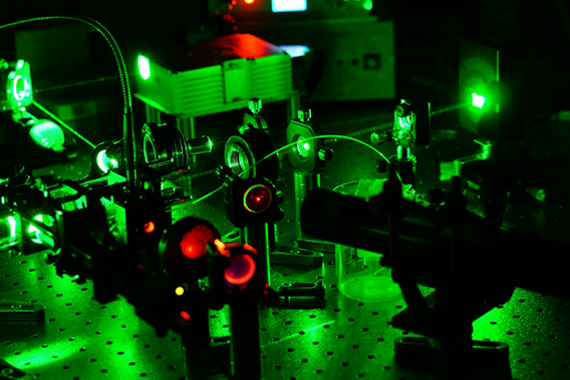
Production of nanoparticles
Nanoparticles are atoms or molecules that are brought together to form combinations. The size of this particle ranges from 1 to 100 nanometers (1 Nanometer = 1 billionth of a meter). We encounter nanoparticles every day in a wide variety of products for daily use. For example, they are found in cosmetic products, coatings, infusions, food supplements and much more. They are thousands of times smaller than the diameter of a human hair.
In the EU project "NanoPAT," scientists are concerned with how to improve quality and efficiency in the production of nanoparticles. Med Uni Graz researchers contribute their expertise in process analytical technologies to the consortium.


